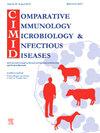Reptile trade and chelonians-associated Salmonellosis in humans: A public health concern
IF 2
3区 农林科学
Q4 IMMUNOLOGY
Comparative Immunology Microbiology and Infectious Diseases
Pub Date : 2025-01-21
DOI:10.1016/j.cimid.2025.102305
引用次数: 0
Abstract
Animal trade has become a serious criminal practice in the world. Every day thousands of exotic wild animals, including reptiles, are farmed and sold worldwide. The illegal collection of turtles and tortoises remains completely unsupervised and represents a big challenge for responsible authorities. This has consequences for animals and public health because it can contribute to the spread of multiple zoonotic pathogens by introducing exotic species into new geographical areas like wet markets, pet shops, and houses. Non-typhoidal Salmonella are bacteria that can commonly cause self-limiting gastroenteritis but can also cause more serious symptoms, especially in more vulnerable people with impaired immune systems. There is growing evidence linking Salmonella to reptiles, especially chelonians, and its prevalence has increased recently as turtles and tortoises have become popular as new pets. These animals can potentially transmit antimicrobial resistant strains of Salmonella to humans, which puts people in danger, especially young children. Pet owners should be aware and take all the control measures to prevent the infection. This updated review investigates the reptile trade situations worldwide, including chelonians, explaining their relationship with the spread of Salmonella and the risk of infections for humans.
爬行动物贸易和与龟类有关的人类沙门氏菌病:一个公共卫生问题。
动物贸易已经成为世界上一种严重的犯罪行为。每天都有成千上万的珍奇野生动物,包括爬行动物,在世界范围内被饲养和出售。非法收集海龟和陆龟仍然完全没有受到监督,这对负责任的当局来说是一个巨大的挑战。这对动物和公共卫生产生了影响,因为它可以通过将外来物种引入新的地理区域,如菜市场、宠物店和房屋,从而促进多种人畜共患病原体的传播。非伤寒沙门氏菌是一种通常可引起自限性胃肠炎的细菌,但也可引起更严重的症状,特别是在免疫系统受损的脆弱人群中。越来越多的证据表明,沙门氏菌与爬行动物,尤其是龟类动物有关。最近,随着海龟和陆龟成为受欢迎的新宠物,沙门氏菌的流行率也有所上升。这些动物可能会将耐抗生素沙门氏菌传染给人类,使人们处于危险之中,尤其是年幼的儿童。宠物主人应注意并采取一切控制措施防止感染。这篇最新综述调查了世界范围内爬行动物的贸易情况,包括龟类,解释了它们与沙门氏菌传播和人类感染风险的关系。
本文章由计算机程序翻译,如有差异,请以英文原文为准。
求助全文
约1分钟内获得全文
求助全文
来源期刊
CiteScore
4.60
自引率
0.00%
发文量
102
审稿时长
40 days
期刊介绍:
Comparative Immunology, Microbiology & Infectious Diseases aims to respond to the concept of "One Medicine" and to provide a venue for scientific exchange. Based on the concept of "Comparative Medicine" interdisciplinary cooperation between specialists in human and animal medicine is of mutual interest and benefit. Therefore, there is need to combine the respective interest of physicians, veterinarians and other health professionals for comparative studies relevant to either human or animal medicine .
The journal is open to subjects of common interest related to the immunology, immunopathology, microbiology, parasitology and epidemiology of human and animal infectious diseases, especially zoonotic infections, and animal models of human infectious diseases. The role of environmental factors in disease emergence is emphasized. CIMID is mainly focusing on applied veterinary and human medicine rather than on fundamental experimental research.

 求助内容:
求助内容: 应助结果提醒方式:
应助结果提醒方式:


